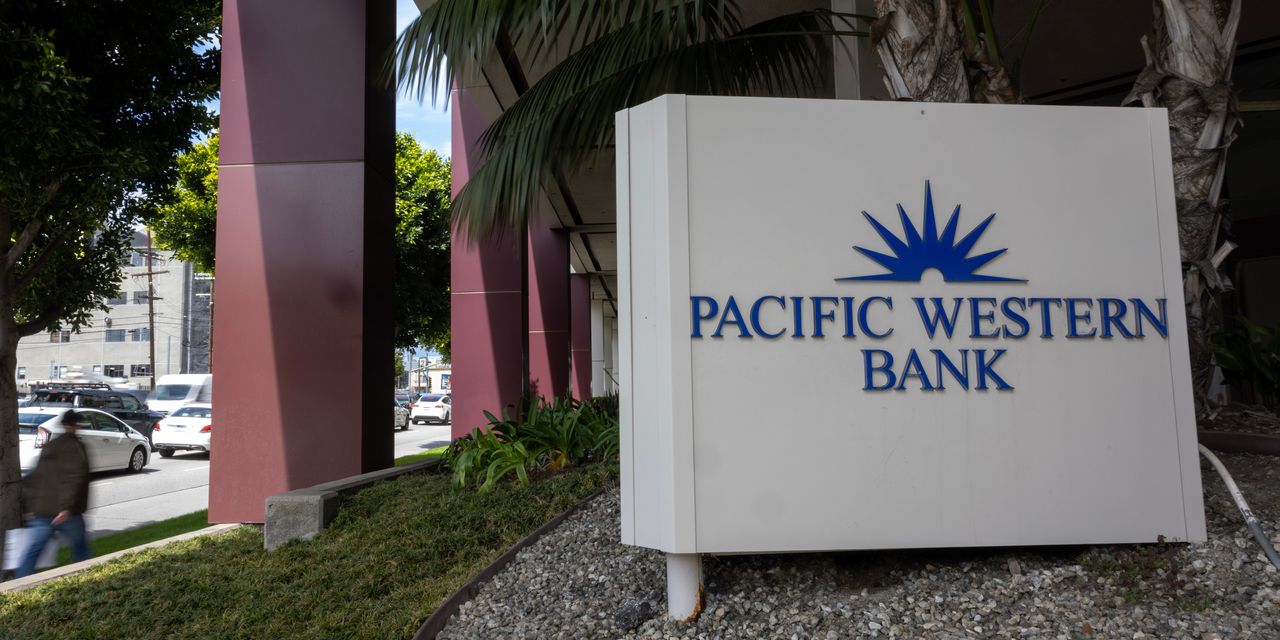This chart shows year-to-date performance for the KBW Nasdaq Bank Index
BKX,
the KBW Nasdaq Regional Banking Index
KRX,
and the S&P 500
SPX,
through Thursday, with dividends reinvested:
Bank stocks have taken it on the chin because of investor fears tied to the decline in market values for the institutions’ bond portfolios as interest rates have risen. This phenomenon helped lead to the failures of three prominent regional banks so far in 2023, although each of the three had a special circumstance that fed deposit flight.
- For Silicon Valley Bank, it was an accelerating outflow of startup companies’ deposits that had ballooned following initial public offerings when interest rates were very low, before March 2022.
- For Signature Bank of New York, a rapid decline in deposits was tied to fears over its business serving clients in the virtual currency industry.
-
For First Republic Bank of San Francisco depositors and investors had several concerns, including a brutal interest-rate mismatch springing from the bank’s business model of serving wealthy clients. First Republic was saddled with a large portfolio of jumbo mortgage loans, which unlike “conforming” residential loans couldn’t be sold to Fannie Mae or Freddie Ma soon after origination. The bank was stuck with fixed-rate loans with interest rates of 3.00% or lower, when the overnight federal-funds rate had been lifted to a target range of 4.75% to 5%. (The Federal Reserve raised the target range again on May 3 to 5% to 5.25%.) Any potential buyer before First Republic failed would have demanded a steep discount to take over its loan and securities portfolios. JPMorgan Chase
JPM,
-1.43%
expects a boost to earnings from its purchase of the failed bank at a steep discount from the Federal Deposit Insurance Corp.
So what’s next for the banking industry? JPMorgan Chase CEO Jamie Dimon said regional banks were “getting near the tail end” of the disruption during a Bloomberg TV interview on Thursday.
Last week, Federal Reserve Chairman Jerome Powell said that the three failed banks “were at the heart” of the industry’s stress and that their resolution “kind of draws a line in the sand.”
Steve Gelsi explains why the regional-bank turmoil might not be over, despite the reassuring words from Dimon and Powell.
He also reports on PacWest Bancorp
PACW,
of Beverly Hills, Calif., whose stock dropped 23% on Thursday after it provided an update on recent deposit outflows.
Here is a longer-term threat to banks’ profits, which may not be limited to regional players.
More coverage of U.S. banks:
Commercial real estate update
By now, most investors understand that reduced office occupancy has near-term and long-term implications for corporate landlords and the banks and other investors that provide their financing. But there are other factors causing a breakdown in the commercial real estate funding market, as Joy Wiltermuth reports.
Aarthi Swaminathan looks at another problem for owners of office buildings (and their lenders): rapid obsolescence.
Read on:
Housing market
Amid signs of slowing economic growth, what may comfort Federal Reserve policy makers trying to lower inflation provides no relief to people who have watched apartment rents rise much more quickly than their wages have risen.
Emma Ockerman shares what may be good news for renters, including useful information about seasonality of rent increases.
More on housing:
A healthcare warning for consumers
Emma Ockerman reports on yet another way U.S. consumers might be pushed into paying more than they need to for services: Be careful if you’re offered a ‘medical credit card.’
The Moneyist shares an update
Quentin Fotrell — The Moneyist — shares an update from a woman who wrote him in 2018 to ask advice about how to make use of $150,000 she had inherited. At that time, she said she expected always to be poor. Here’s how she has fared since then.
More from the Moneyist:
Meta, Facebook and artificial intelligence
Shares of Meta Platforms Inc.
META,
— Facebook’s parent company — have nearly doubled this year, following a 64% decline in 2022. To add perspective, the stock is still down 30% from the end of 2021. It trades for 18.5 times the consensus earnings estimate for the next 12 months among analysts polled by FactSet. That compares to a forward price-to-earnings ratio of 18.1 for the S&P 500.
But the slight premium for Meta, when compared to the index, might be worth paying. Consensus estimates through 2025 point to a 25.4% three-year compound annual growth rate for Meta’s earnings per share from 2022 and a two-year CAGR of 20.3% from 2023. Analysts expect the S&P 500’s weighted aggregate earnings to rise at a three-year CAGR of 11.3% through 2025, with a two-year CAGR of 8.0%.
Investors cannot help but to have noticed that Meta CEO Mark Zuckerberg no longer touts the “metaverse” with great enthusiasm. The next big thing and the best buzzword now is AI. Jon Swartz explains what Meta is doing to jump on the AI bandwagon.
Auto market news
Tesla
TSLA,
is recalling 1.1 million cars sold in China to address a defect identified by the country’s State Administration for Market Regulation.
Rivian Automotive
RIVN,
had some good financial news this week, and the worst may be over for its stock, as Claudia Assis reports.
Jurica Dujmovic takes a look at the “beautiful and dynamic” Rimac Nevera electric car, for which there may not be much of a market.
Other auto market news and opinion:
Ready for takeoff — finally
After many years of waiting, Virgin Galactic Holdings
SPCE,
expects its Unity 25 spacecraft to make its first commercial flight in June, as James Rogers reports.
Want more from MarketWatch? Sign up for this and other newsletters to get the latest news and advice on personal finance and investing.
Read the full article here


